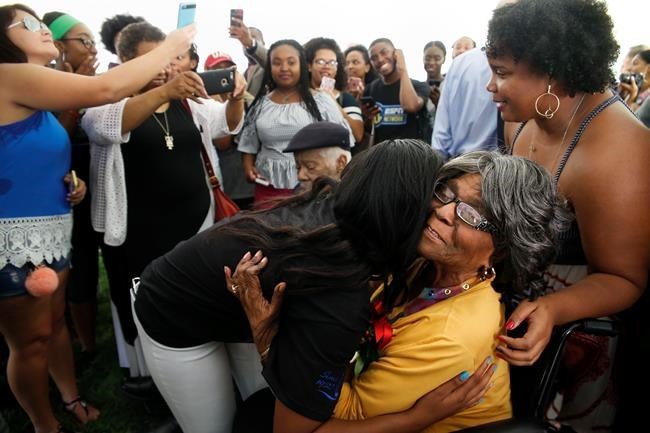
Autherine Lucy Foster, the first black student admitted to an all-white college in Alabama, gets a hug from University of Alabama senior Alecea Watkins, as The University of Alabama unveiled a historic marker honoring Friday, Sept. 15, 2017, in Tuscaloosa, Ala. The University of Alabama is reconsidering its decision last week to retain the name of a one-time governor who led the Ku Klux Klan on a campus building while adding the name of the school's first Black student. Trustees will meet publicly in a livestreamed video conference on Friday, Feb. 11, 202, to revisit their decision to keep the name of former Alabama Gov. Bibb Graves on a three-story hall while renaming it Lucy-Graves Hall to also honor Autherine Lucy Foster, the University of Alabama System said. (Gary Cosby Jr./The Tuscaloosa News via AP)
Republished February 11, 2022 - 10:30 AM
Original Publication Date February 11, 2022 - 8:26 AM
BIRMINGHAM, Ala. (AP) — University of Alabama trustees voted Friday to strip the name of a one-time governor who led the Ku Klux Klan from a campus building and rename it solely for the school's first Black student.
The unanimous vote reversed a decision last week to add the name of Autherine Lucy Foster, who briefing attended the all-white state school in 1956, to a building honoring Bibb Graves, a progressive, pro-education governor who also ran a Montgomery KKK group a century ago.
Rather than Lucy-Graves Hall, the classroom building will be known as Autherine Lucy Hall, trustees decided.
“It’s never too late to make the right decision,” said John England, a former trustee who led a committee that initially recommended the joint name and then reversed itself after criticism that Graves didn't deserve to have his name alongside that of Lucy, now 92 and living in metro Birmingham.
Trustees didn't mention the topic of Graves' leadership in the notorious hate group during an online meeting, but England said some questioned why the woman's married name of “Foster” wouldn't be on the structure.
Foster's family wanted to use her maiden name since she was known as Autherine Lucy while originally on campus, said Chancellor Finis St. Johnson. Foster had expressed ambivalence about being honored alongside Graves, saying she didn't know much about him or seek out the recognition but would accept it.
Foster briefly attended classes in Graves Hall but was expelled after three days when her presence brought protests by whites and threats. Foster was awarded an honorary doctorate in 2019 by the university, where she had returned and earned a master's degree in education in 1992.
Explaining the original reasoning for proposing Lucy-Graves Hall, England said committee members hoped that having a building named for both Graves and Foster would “generate educational moments that can help us learn from our conflicts and rich history." While the main intent was meant to honor Foster, that “sort of took the background” after the decision, he said.
“That’s not what we wanted,” he said.
The student newspaper was among those complaining about the inappropriateness of retaining the name of a Klan leader on a campus building.
Several Alabama universities have removed Graves’ name from buildings in recent years as the nation reconsidered its history and white supremacy. Troy University renamed its Bibb Graves Hall for the late Rep. John Lewis, who was denied admission there in 1957 and led voting rights marchers in Selma in 1965.
News from © The Associated Press, 2022